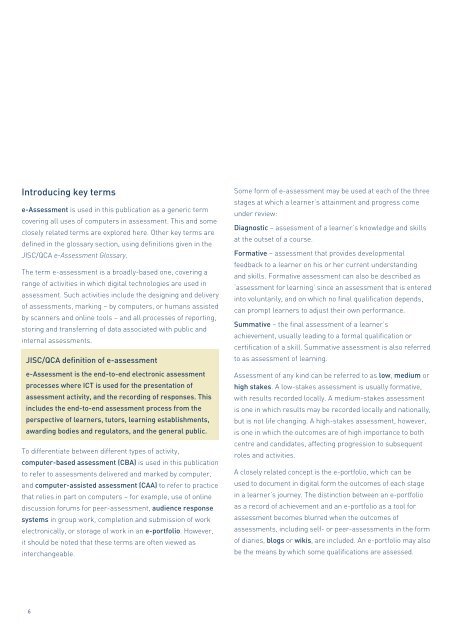Effective Practice with e-Assessment: An overview of ... - Jisc
Effective Practice with e-Assessment: An overview of ... - Jisc
Effective Practice with e-Assessment: An overview of ... - Jisc
Create successful ePaper yourself
Turn your PDF publications into a flip-book with our unique Google optimized e-Paper software.
Introducing key terms<br />
e-<strong>Assessment</strong> is used in this publication as a generic term<br />
covering all uses <strong>of</strong> computers in assessment. This and some<br />
closely related terms are explored here. Other key terms are<br />
defined in the glossary section, using definitions given in the<br />
JISC/QCA e-<strong>Assessment</strong> Glossary.<br />
The term e-assessment is a broadly-based one, covering a<br />
range <strong>of</strong> activities in which digital technologies are used in<br />
assessment. Such activities include the designing and delivery<br />
<strong>of</strong> assessments, marking – by computers, or humans assisted<br />
by scanners and online tools – and all processes <strong>of</strong> reporting,<br />
storing and transferring <strong>of</strong> data associated <strong>with</strong> public and<br />
internal assessments.<br />
JISC/QCA definition <strong>of</strong> e-assessment<br />
e-<strong>Assessment</strong> is the end-to-end electronic assessment<br />
processes where ICT is used for the presentation <strong>of</strong><br />
assessment activity, and the recording <strong>of</strong> responses. This<br />
includes the end-to-end assessment process from the<br />
perspective <strong>of</strong> learners, tutors, learning establishments,<br />
awarding bodies and regulators, and the general public.<br />
To differentiate between different types <strong>of</strong> activity,<br />
computer-based assessment (CBA) is used in this publication<br />
to refer to assessments delivered and marked by computer,<br />
and computer-assisted assessment (CAA) to refer to practice<br />
that relies in part on computers – for example, use <strong>of</strong> online<br />
discussion forums for peer-assessment, audience response<br />
systems in group work, completion and submission <strong>of</strong> work<br />
electronically, or storage <strong>of</strong> work in an e-portfolio. However,<br />
it should be noted that these terms are <strong>of</strong>ten viewed as<br />
interchangeable.<br />
Some form <strong>of</strong> e-assessment may be used at each <strong>of</strong> the three<br />
stages at which a learner’s attainment and progress come<br />
under review:<br />
Diagnostic – assessment <strong>of</strong> a learner’s knowledge and skills<br />
at the outset <strong>of</strong> a course.<br />
Formative – assessment that provides developmental<br />
feedback to a learner on his or her current understanding<br />
and skills. Formative assessment can also be described as<br />
‘assessment for learning’ since an assessment that is entered<br />
into voluntarily, and on which no final qualification depends,<br />
can prompt learners to adjust their own performance.<br />
Summative – the final assessment <strong>of</strong> a learner’s<br />
achievement, usually leading to a formal qualification or<br />
certification <strong>of</strong> a skill. Summative assessment is also referred<br />
to as assessment <strong>of</strong> learning.<br />
<strong>Assessment</strong> <strong>of</strong> any kind can be referred to as low, medium or<br />
high stakes. A low-stakes assessment is usually formative,<br />
<strong>with</strong> results recorded locally. A medium-stakes assessment<br />
is one in which results may be recorded locally and nationally,<br />
but is not life changing. A high-stakes assessment, however,<br />
is one in which the outcomes are <strong>of</strong> high importance to both<br />
centre and candidates, affecting progression to subsequent<br />
roles and activities.<br />
A closely related concept is the e-portfolio, which can be<br />
used to document in digital form the outcomes <strong>of</strong> each stage<br />
in a learner’s journey. The distinction between an e-portfolio<br />
as a record <strong>of</strong> achievement and an e-portfolio as a tool for<br />
assessment becomes blurred when the outcomes <strong>of</strong><br />
assessments, including self- or peer-assessments in the form<br />
<strong>of</strong> diaries, blogs or wikis, are included. <strong>An</strong> e-portfolio may also<br />
be the means by which some qualifications are assessed.<br />
6
















